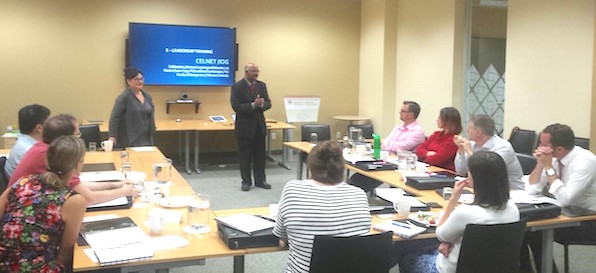News
» Go to news mainSucceeding online: CELNET takes off

âWe took a chance,â says Dr. Martine Durier-Copp, director of the Centre for Advanced Management Education (CFAME). In 2015, she and Dr. Binod Sundararajan, an associate professor in the Rowe School of Business, recognized a growing need in management education: a way to learn the skills necessary to manage virtual teams. Together, they founded CELNETâthe Collaboration, eLearning, Networks Lab. The two are now co-directors of the lab.
Durier-Coppâs field of expertise is online and blended learning, and CFAMEâs work is based in virtual collaboration. She and her team have researched the ways human interactions change online. âWhat is emerging from the research is that the skills and approaches needed in virtual teaching are substantially different from in-person teaching,â she explains. âSo Binod and I brought our different skills to that issue to create a space that would be entirely dedicated to researching and consultancy in this form of pedagogy.â Sundararajanâs skills, he explains, mesh well with Durier-Coppâs. âMy research has been in e-learning; my dissertation and primary research have been on technology-mediated communication. And I shamelessly collaborate.â Durier-Coppâs background and Sundararajanâs âshameless collaborationâ have enabled the two colleagues to make their project pilipiliÂț»ful. âWe tag team very well,â he says.
The co-directors applied for funding from the Rowe gift to open the lab and received $20,000. They used it to hire research assistants who had learned their skills from the Master of Library and Information Studies Program in the School of Information Management. After a literature review and empirical research with retired Rowe School professor Dr. Elizabeth Kelley, âwe landed on e-leadership as a critically important area of management teaching and practice,â says Durier-Copp.
CELNET was initially dedicated entirely to research and pedagogy, but on the advice of colleagues, Sundararajan and Durier-Copp began consulting as well. âThis is a very important field because people think that what they do in the real world is directly applicable to virtual scenarios, but itâs not,â says Sundararajan. He explains that aside from learning to work with new technology, other factors prevent people from working effectively in the virtual world. Thinking about how best to introduce the concepts useful to e-leaders, âWe developed what we call ConnecT© for e-leadership, which connects the âCâsâsuch as culture, complexities, communications and contextâwith the âTâsâtasks, timeline, team and technology,â he says. Using the ConnecT© framework, Sundararajan and Durier-Copp deliver comprehensive courses in how to lead and manage groups working together remotely.
Earlier this month, they began a collaboration with the Institute on Governance, which specializes in training federal government employees in leadership. âWe jointly presented our findings and the ConnecT© framework to senior executives in the federal government,â says Durier-Copp. The two have been invited to present to the government again in 2017. They have also been invited to deliver a workshop in October at the Atlantic Interjurisdictional Executive Leadership Development Program, undertaken in partnership with the School of Public Administration.
Sundararajan describes the workshop they hosted for the first round of civil servants in Ottawa. âPart of our framework deployment is to give them a case. We use Google Hangouts,â he explains. âWe had nine participants; we gave them each a different role to play in a highly complex situation, and we gave the characters exaggerated characteristics such as arrogance. And they had to collaborate virtually to tell their prime minister what to do.â The participants, says Durier-Copp, applied the ConnecT© framework in the scenario, which was based on the real dioxin food contamination crisis in Belgium.
It appears from the invitations for further presentations and from substantial positive feedback that the workshop was a pilipiliÂț». (âFor a debut, I think we did well,â says Sundararajan.) Now, aside from the October workshop, Durier-Copp and Sundararajan can focus on other ways in which CELNET can be useful. âOur vision is huge,â says Durier-Copp. âWe see CELNET becoming a resource for all of the Faculty of Managementâs schools and programs. I think everyone should be learning e-leadership.â
She explains that organizations are increasingly working through virtual teams. âTheir prevalence is quite extraordinary,â she says, âyet very few organizations actually prepare people to work virtually, let alone to manage virtually. We want to translate that into our teaching and prepare our students to be virtual managers.â
Discussing the dedication of Sundararajan and herself and their plans for the future, Durier-Copp sums it up: âWe look forward to great things.â
Recent News
- Grad profile: Finding a pathway to midâlife career shift
- Grad profile: Enriching her public service
- Grad profile: A leader grows as a learner
- Grad profile: Passionate about privacy
- Grad profile: Broadening her skills and mind
- A boost to her service
- Credentialing a career: New MIM grad John Jenkins complements career experience with formalized learning
- Leaning in to leadership: New MPA(M) grad Laura Dowling learns management skills while building career and family
